World Para-athletics Championships: Who to watch and when
- Published
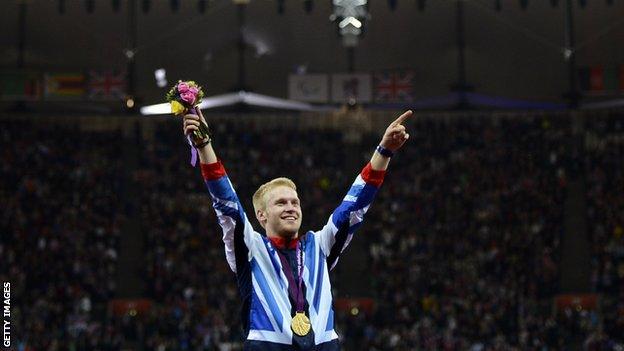
Jonnie Peacock returns to the scene of his London 2012 gold medal success
World Para-athletics Championships |
|---|
Location: London Stadium, London Dates: Friday 14 July - Sunday 23 July |
Coverage: Commentary on BBC Radio 5 live, BBC World Service and live updates on the BBC Sport website and app |
London Stadium has come alive as the World Para-athletics Championships takes place at the home of the 2012 Paralympic Games.
It has been billed as the biggest edition of the event ever, with more tickets sold than in all of the eight previous championships combined.
But who are the big names, when are the big races and how can you keep across the action? Here is everything you need to know.
I was told I was too old for athletics - Whitehead
When is it on?
The championships opened on Friday evening and run until Sunday, 23 July. There are evening sessions every day, as well as morning sessions from Saturday 15 to Tuesday 18 July and on the final Saturday and Sunday.
Don't West Ham play at London Stadium now?
They do, but they have to share. The recent Anniversary Games, the World Para-athletics Championships and the World Athletics Championships, which run from 4 to 13 August, are all being held at the venue this summer.
West Ham's first three Premier League games of the 2017-18 season will be played away from home to accommodate the athletics.
How many tickets have been sold?
As of 6 July there had been 230,000 tickets sold, making it the most well attended World Para-athletics Championships in history. There are still tickets remaining should you decide to go.
How can I tune in?
BBC Radio 5 live will be bringing you commentary throughout the 10 days, as will BBC World Service, and there will be live updates on the BBC Sport website and app. You can also watch the action on Channel 4.
How many athletes? How many events?
A total of 1,074 athletes are competing from 91 nations, with 213 medal events. Great Britain have a 49-strong team.
Who are the big British names?
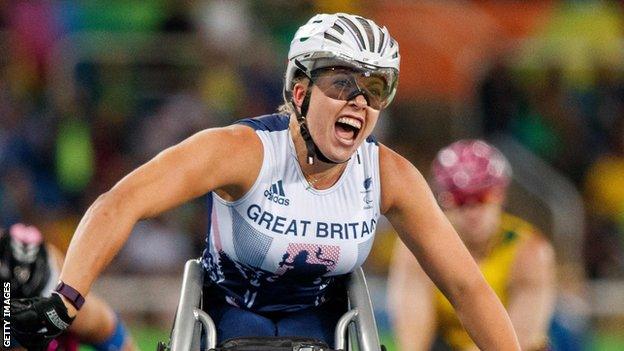
Hannah Cockroft can complete a treble-treble in London, having won three gold medals at the 2015 World Championships and Rio 2016
Jonnie Peacock, the 100m sprint star who won gold at the 2012 and 2016 Paralympics, came to London in search of a second world title, and got it on Sunday.
Hannah Cockroft won three gold medals at Rio 2016 and arrived at the championships with 12 Paralympic and World titles to her name - a total she has added to with 100m and 800m golds, with the 400m still to come
Aled Davies and Jo Butterfield dominated the shot put and club throw respectively in Rio and were expected to do the same again. Davies defended his F42 discus world title on Sunday.
Kadeena Cox made a name for herself in Brazil by winning gold on the cycling track and athletics track. She began in London with a bronze in the T38 200m, and was hoping to add a 400m world title to her accomplishments.
Richard Whitehead, Hollie Arnold and Sophie Hahn all replicated the gold-winning success in Rio as early as day two at these championships, while Georgie Hermitage and Paul Blake had hopes of following suit.
Where's David Weir?
Ten-time Paralympic medallist David Weir was never considered for selection after he withdrew from British Athletics earlier this year because of a fallout with coach Jenni Banks.
He has subsequently retired from track racing to focus on long-distance road racing and made his last competitive appearance last week at the London Anniversary Games.
The absence of Libby Clegg should also be mentioned. Clegg won two sprint golds at Rio 2016 but had to pull out of this summer's event through injury.
Where will GB finish in the medal table?
Honour to captain Great Britain - Greaves
The British team finished fourth in the medal table at the last World Championships in Doha two years ago. GB had 31 medals, 13 gold, and came behind China, Russia and the US.
GB will match that tally of golds if all of their victorious athletes from Rio 2016 repeat their success.
Russia will not be competing because they remain banned by the International Paralympic Committee following evidence of widespread doping, so GB will expect to move up the table by at least one place.
Remind me how classifications work...
Each athletics event is given a code, made up of one letter and two numbers, which is called a classification. It tells you more about the type of disability the athletes in that event have.
The first letter will either be T or F: T is for track (running and jumping events) and F is for field (throwing events).
The first number, from 1 to 5, tells you the impairment type: 1. Visual impairment 2. Intellectual impairment 3. Co-ordination impairment 4. Limb deficiencies and short stature 5. Impaired muscle power or range of movement.
The second number ranges from 1 to 8 and designates the level of impairment, with 1 being the most impaired.
When are the Brits in action? Day-by-day guide
All times BST
Friday, 14 July
As many predicted, Hannah Cockroft took gold in the 100m T34, setting a world record in the process, while 16-year-old Kare Adenegan claimed silver. There was also a bronze for Gemma Prescott in the F32 club final, although Jo Butterfield narrowly missed out on a medal in the F51 club final.
Saturday, 15 July
Stef Reid won gold in the T44 long jump - improving on her silvers from London 2012 and Rio 2016. On a memorable day for Great Britain, Richard Whitehead defended his T42 200m title while compatriot David Henson took bronze. Hollie Arnold took F46 javelin gold with a world record throw, and Sammi Kinghorn and Sophie Hahn completed the T53 and T38 200m respectively in world record time.
Fellow Briton Kadeena Cox took bronze behind Hahn. There were also silver Toby Gold and bronze for Andrew Small in the T33 100m to put GB top of the medal table with 12 in total across the first two days.
Sunday, 16 July
Aled Davies successfully defended his F42 discus world title by winning gold, but Dan Greaves missed out on a medal as the three-time world champion finished fourth in the F44 discus.
Double Paralympic champion Jonnie Peacock, who missed the World Championships two years ago through injury, took gold in the T44 100m final, while Maria Lyle took bronze in the women's 200m T35 race.
The Republic of Ireland picked up two gold medals, through Jason Smyth in the T13 100m and then moments later from Michael McKillop in the men's 800m T38m final.
Monday, 17 July
Olivia Breen won the T38 long jump to secure a ninth gold medal for Great Britain in the morning session.
There were two British golds in the evening session with Hannah Cockroft winning the T42 100m and Sophie Kamlish winning the T44 100m.
Richard Whitehead added T42 100m bronze to his 200m gold, while Kare Adenegan finished third in Cockroft's event to add bronze to her 100m silver.
International watch: American Tatyana McFadden claimed her second and third golds of the championships in the T54 1500m and T54 400m.
Tuesday, 18 July
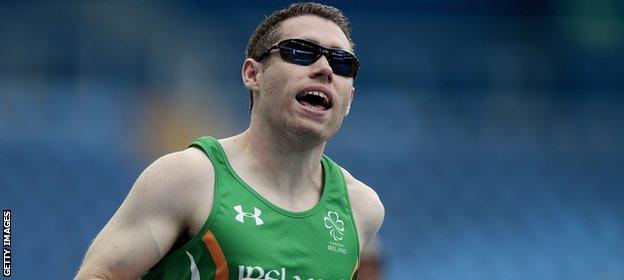
Irishman Jason Smyth's 100m in 10.46 seconds is the fastest of any Para-athlete
There were no medals for GB on day five, with T42 long jumper Luke Sinnott finishing fourth in his debut at a major event.
Team-mate Richard Chiassaro also had to settle for fourth in the T54 200m, with compatriot Nathan Maguire sixth.
Sabrina Fortune, who won F20 shot put bronze at Rio 2016, could only come sixth, while teenager Polly Maton was fifth in the T46/47 100m.
International watch: Ireland sprinter Jason Smyth won T13 200m gold to add to his 100m title and confirmed his status as the world's fastest Para-athlete.
Wednesday, 19 July
Sammi Kinghorn won her second medal of the championships with a bronze in the T53 400m, while Maria Lyle picked up her second bronze in the women's T35 200m.
International watch: American Tatyana McFadden made it four gold medals from four events at the championships with success in the T54 800m.
Thursday, 20 July
Great Britain won two gold medals, a silver and four bronze medals in the space of a frantic hour on day seven.
Hannah Cockroft claimed her third gold of the championships in the T34 400m, while Kare Adenegan won a bronze in the same race.
World record holder Georgie Hermitage successfully defended her T37 400m title and Kyron Duke took silver in the men's F41 shot put.
There were further bronze medals for Isaac Towers in the T34 800m, Richard Chiassaro in the T54 400m and Stephen Miller in the F32 club throw.
Friday, 21 July
Kadeena Cox, who won four medals in cycling and athletics at Rio 2016, secured the world title in the T38 400m to add to her Paralympic crown.
But team-mate Paul Blake was unable to repeat his success from Brazil in the T36 400m and finished fourth.
International watch: American Paralympic champion David Brown, the first totally blind athlete to run 100m in 11 seconds, had to settle for silver in the T11 200m.
Saturday, 22 July
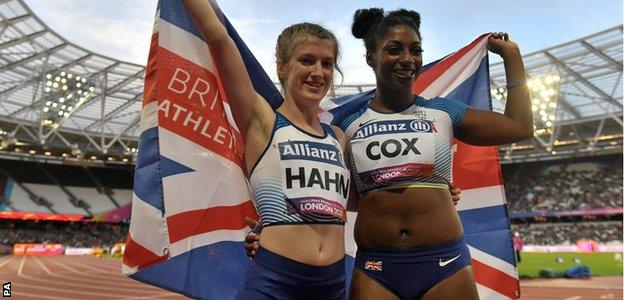
Sophie Hahn and Kadeena Cox finished first and second respectively in the women's T38 100m
Sophie Hahn, Aled Davies and Georgie Hermitage all won their second gold medals of the championships.
Hahn set a new world record as she added the T38 100m to her 200m success. Hermitage, the T37 400m champion, won the 100m, before Davies also broke a world record in the F42 shot put after his discus victory earlier in the week.
There were also silver medals won by Jonathan Broom-Edwards in the T44 high jump and Kadeena Cox in the T38 100.
Sunday, 23 July
Sammi Kinghorn clinched her second gold medal of the championships with victory in the women's T53 100m.
There were three silver medals for Great Britain - from Polly Maton in the women's T47 long jump, Jordan Howe in the men's T35 100m and Mickey Bushell in the men's T53 100m.
- Published11 July 2017
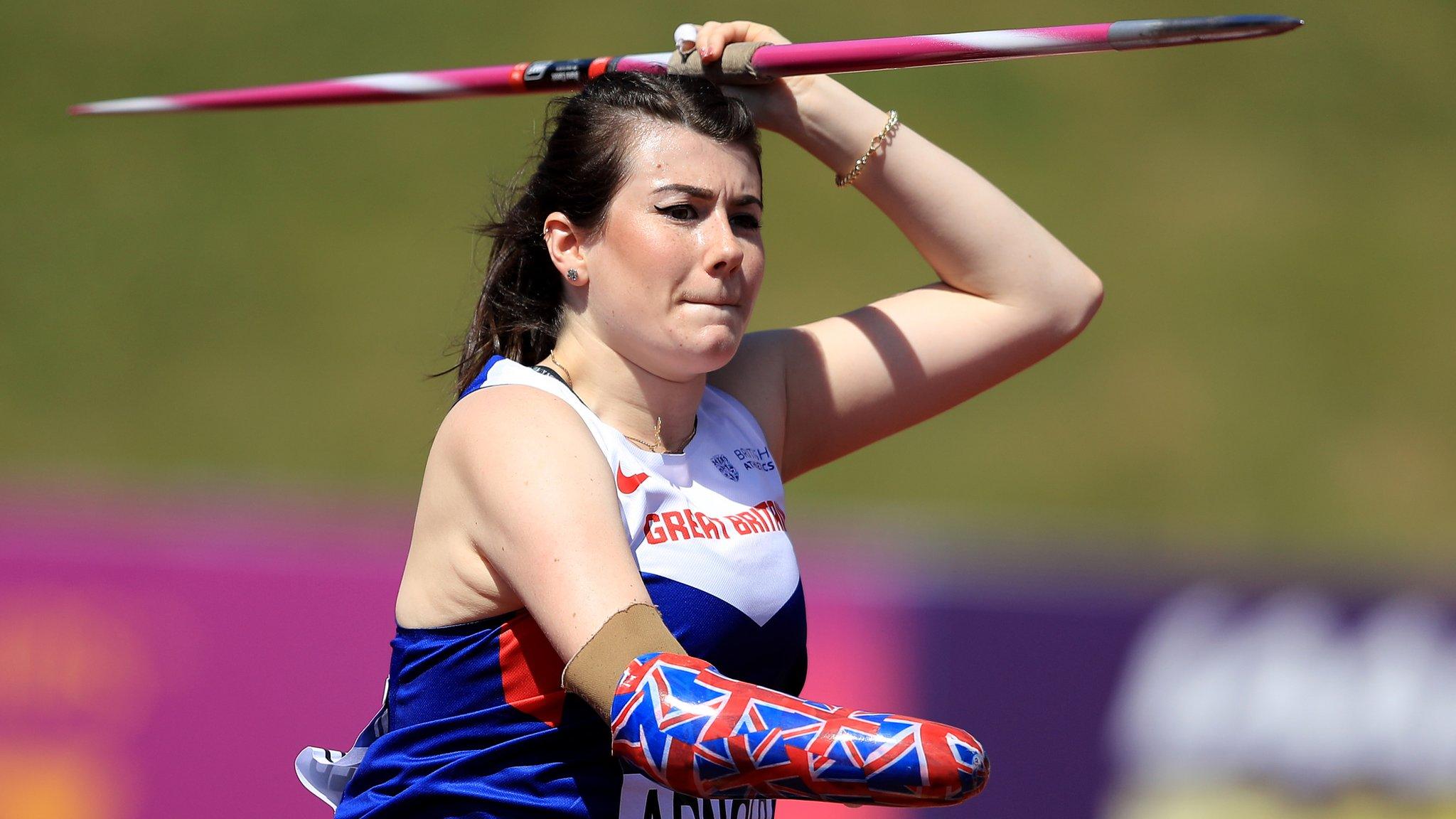
- Published23 July 2017
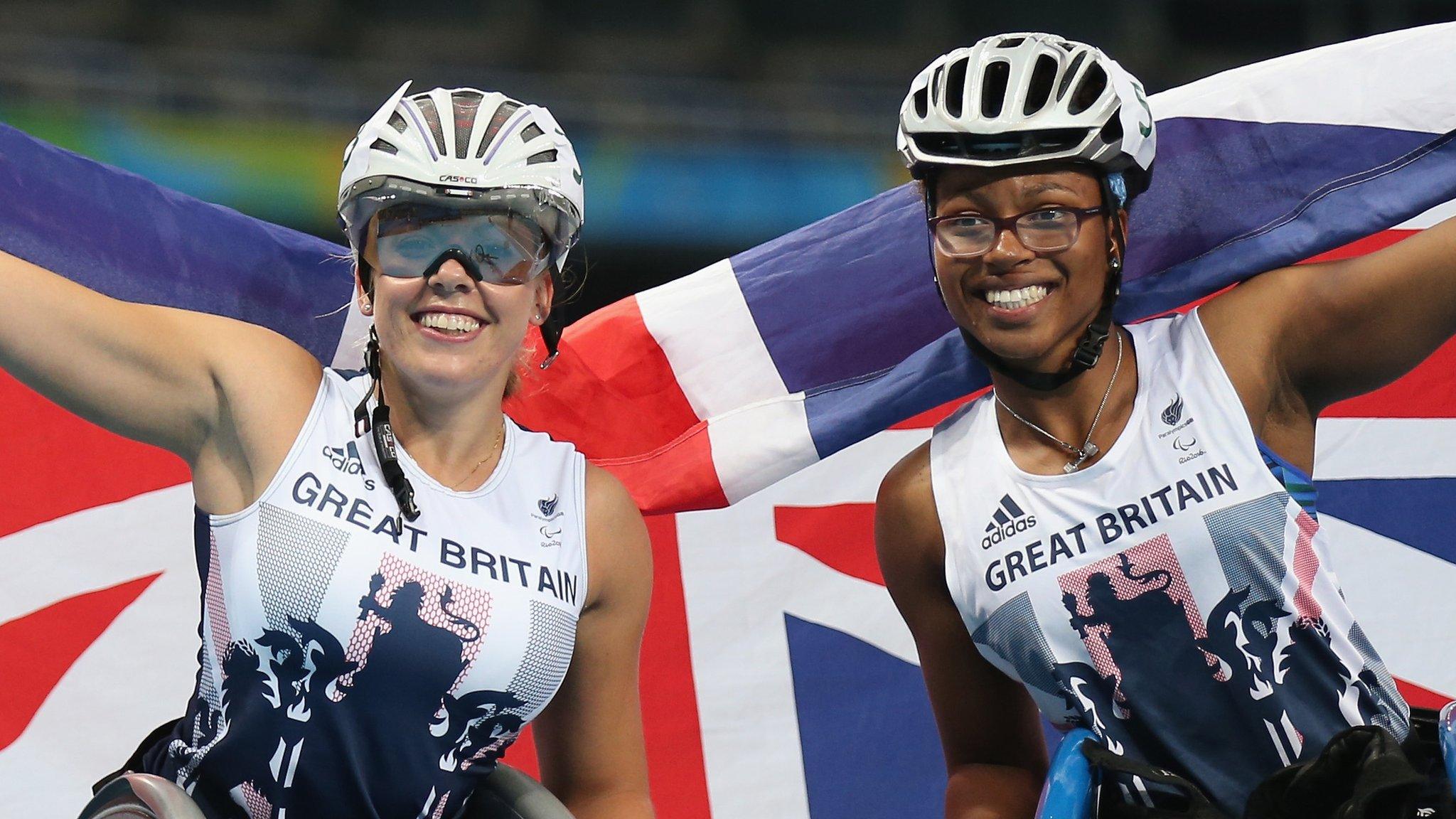
- Published8 February 2019
